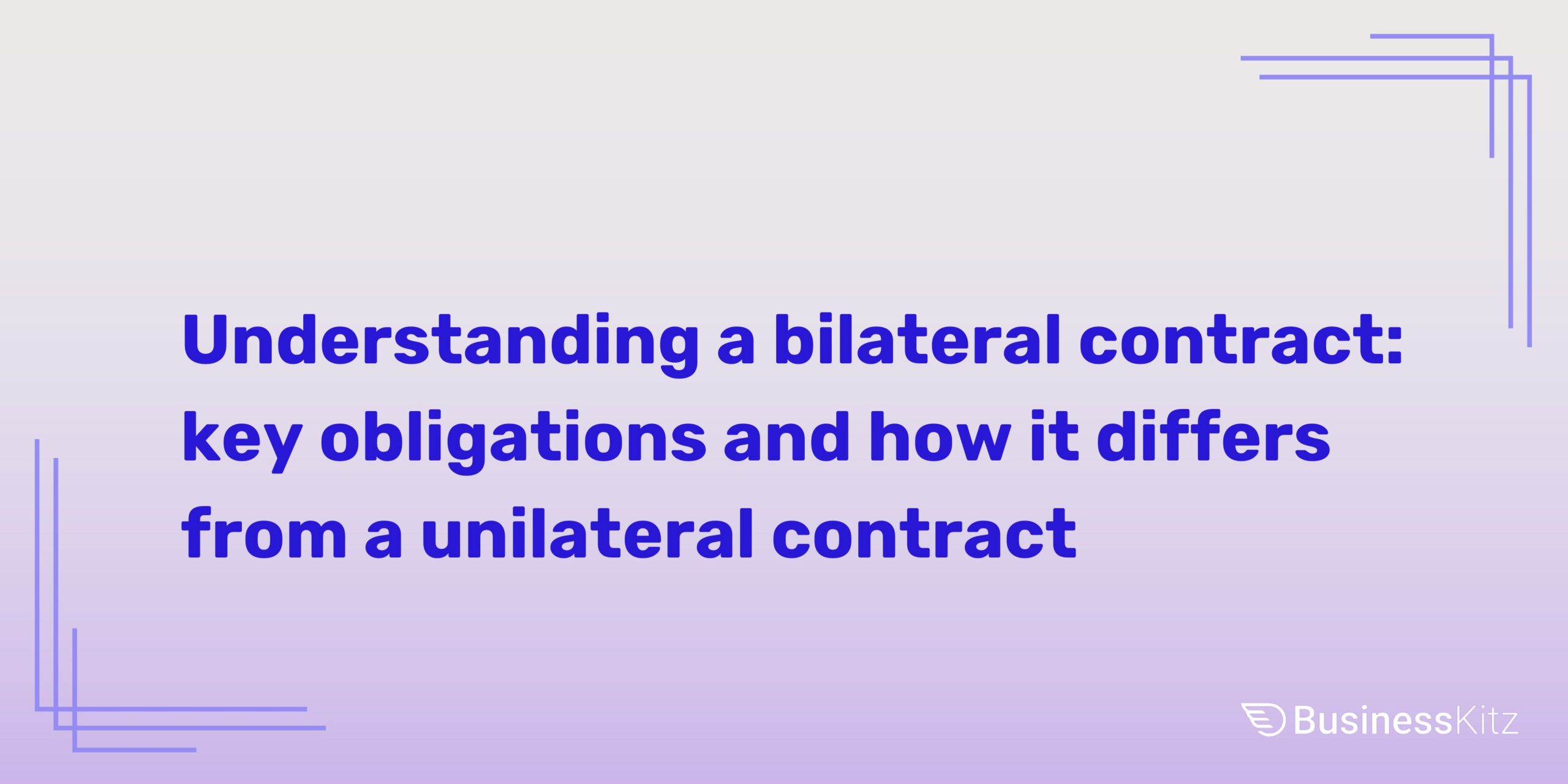
We've helped businesses save $55m with our all-in-one platform. Get instant access to this template and 115+ others, plus AI-powered document creation, starting completely free.
A bilateral contract is a common agreement in business where two parties make mutual promises. Understanding this type of contract is crucial for businesses, as it sets clear roles and expectations. Whether you're entering into a sales deal, employment agreement, or service contract, knowing how a bilateral contract works helps protect your business and ensures fair outcomes for all parties involved.
A bilateral contract is an agreement where two or more parties make mutual promises. Each party agrees to do something in exchange for something else. Once both parties accept the terms, the contract becomes legally binding. Bilateral contracts are common in business, such as in sales agreements, employment contracts, and vendor services.[ez-toc]
Every business deal starts with an agreement. But not all agreements are equal. Knowing the type of contract you’re entering into can protect you from risk, save time and improve how you manage business transactions.Whether you’re a business owner, a freelancer or part of a growing company, contracts form the base of your business relationships. They guide who must do what, when, and how. A clear understanding of contract law helps you avoid mistakes, build trust and grow with confidence.One common type of contract is the bilateral contract, where two or more parties agree to mutual obligations. Another is the unilateral contract, which relies on one party making a promise that the other accepts through action. Each type has different legal weight and use cases. Knowing when and how to use each can change how you operate.By understanding the difference between these two, you will:
In this article, you’ll learn:
Let’s break it down and learn about bilateral and unilateral vs contracts with real-world tips you can use right away.

A bilateral contract is an agreement where two or more parties make mutual promises. Each party agrees to do something in exchange for something else. This mutual exchange is what makes it a contract. A bilateral contract is a legally binding agreement once both sides accept the terms.This type of contract is common in business. One party promises to provide a service, and the other party promises to pay a certain amount. Because both sides have duties to meet, each party is bound to fulfil their promise. If one party fails, the other may have legal options to claim loss or damages.
Bilateral contracts are the most common type of contract. They are used in:
Example of a bilateral contract: A real estate sales contract. A buyer promises to pay a certain amount, and the seller promises to transfer the property. Both parties understand their roles and are bound by the deal once the contract is signed.
Party RoleObligationBuyerPromise to pay the agreed priceSellerPromise to transfer goods or servicesEmployerPromise to pay wagesEmployeePromise to perform agreed job dutiesA bilateral contract is a legally binding tool that helps manage business deals clearly and fairly. It ensures that promises to pay or provide something of value are not just understood but also enforceable.
A unilateral contract is a type of contract where only one party makes a promise. The contract is formed when the other party completes a task or takes an action. This means acceptance happens through performance, not through a signed agreement.Unlike bilateral contracts, unilateral contracts rely on only one side making a legal promise. The other side is not bound to do anything unless they choose to act. Once they act, the contract is legally binding.A common example of a unilateral contract is a lost pet reward. If someone offers $500 to find their dog, no contract is formed until a person finds and returns the dog. That act of returning the dog means the party making the offer is now bound to fulfil their promise to pay.
Use this table to compare the two clearly.FeatureBilateral ContractUnilateral ContractNumber of parties involvedTwo or more partiesOne party makes a promiseFormationBased on mutual exchange of promisesBased on the performance of one partyBinding on partiesBoth parties are bound to fulfil their promiseOnly the offering party is bound, once performance occursCommon use caseEmployment, sales contractsLost item reward, insurance contracts
The difference between unilateral and bilateral contracts affects risk, cost and planning. Contracts and bilateral contracts often need clear terms up front. But types of unilateral contracts leave more room for uncertainty.Unilateral contracts may suit rewards or insurance services where action triggers the deal. But for clear terms and conditions, a bilateral contract is an agreement that protects both sides better. Contracts can help business professionals by reducing gaps in trust, setting clear roles and letting parties to negotiate ahead of time.

Choosing between a unilateral or bilateral contract depends on the type of agreement you need. Each has its strengths and weaknesses. Here’s how to decide which one works best for you.
Certain industries favour bilateral contracts while others prefer unilateral contracts. Understanding these preferences can guide your decision.
Choosing the right contract type requires weighing the pros and cons.Contract TypeProsConsBilateralClear mutual obligations, well-suited for business dealsRequires both parties to fulfil their promises, more complexUnilateralSimple, ideal for reward-based or incentive offersOnly one party is obligated, less security for one side
In each case, the type of contract depends on the roles, obligations, and how the agreement will be completed.
Creating a legally binding contract requires attention to key legal elements. Understanding these basics helps ensure that your contract is valid and enforceable.
For a contract to be legally binding, it must contain the following:
To make sure your contract is legally binding, follow this checklist:
When drafting a contract, follow these steps:
Business Kitz makes contracts simple. The platform offers automated templates that cover key business elements. You can quickly add your terms, customise details, and ensure everything is in place. With e-signatures, you can also streamline the signing process, making the contract fully valid and easy to store securely.By using Business Kitz, you can confidently draft and manage your contracts while meeting all necessary legal standards. Sign up for free here.

A breach of a bilateral contract occurs when one party fails to fulfil their promises. Understanding the types of breaches and the consequences can help you manage risks effectively.
A breach happens when one party doesn't honour the terms and conditions of the contract. There are three main types:
When a breach happens, the non-breaching party has several options. Common remedies include:
To avoid breaches, both parties must monitor their obligations and timelines closely. Staying on track helps ensure neither party misses deadlines or falls short of expectations. Regular checks on the progress of commitments can prevent small issues from turning into larger problems.
Seeking legal advice on contracts can help you avoid costly mistakes. Expert input is crucial in certain situations to ensure your business stays protected. If you are needing your legal support you can get a free consultation from Legal Kitz.
Some contracts require legal advice, especially when they involve complex details or high stakes. Consider consulting a lawyer when:
When selecting a lawyer, keep these tips in mind:
While legal advice is essential for complex situations, Business Kitz can complement this support. The platform offers ready-to-use templates that are compliant and easy to customise. These templates help streamline the contract drafting process, saving you time and reducing the risk of errors. By combining legal advice with Business Kitz's automated tools, you can confidently create and manage contracts with less effort.
Bilateral contracts are common in many industries. These contracts ensure both parties fulfill their obligations. Let’s explore some examples across different sectors.
Bilateral contracts offer several advantages, including:
IndustryExampleBusiness BenefitsReal EstateSales agreementClear terms of property transfer, enforceable in courtHealthcareEmployment contractDefines roles and compensation, supports legal complianceLegalService agreementClear payment terms, ensures both parties fulfil their obligationsBilateral contracts create a secure and clear framework for both parties in these industries. They help build trust and ensure that business deals proceed smoothly.
Unilateral contracts are different from bilateral contracts. They involve one party making a promise that is accepted through performance. Several types of unilateral contracts are common in business. Here’s a look at the main types and how they are used.
For a unilateral contract to be enforceable, certain conditions must be met. These include:
These contracts need to be carefully documented to ensure enforceability. If the terms are unclear, one party may fail to fulfil their promise, leading to potential disputes.
A bilateral contract is an agreement where two or more parties make mutually binding promises. Both parties agree to do something in return for something else. This means that both parties have obligations to fulfil, making the contract legally enforceable.
Unlike unilateral contracts, bilateral contracts involve mutual promises from both parties. In a unilateral contract, only one party makes a promise that the other accepts by performing an action. Bilateral contracts require at least two parties, while a unilateral contract needs just one party's action for acceptance.
Yes, for a bilateral contract to be valid, both parties must agree to the pre-decided terms and conditions. Acceptance of an offer by both parties forms the foundation of the contract, making it legally binding.
If one party fails to meet their obligations in a bilateral contract, the other party can seek legal remedies. This could include claiming damages, demanding performance, or terminating the contract, depending on the situation.
No. Both parties must have the legal capacity to contract. This means they must be of legal age, mentally sound, and not under duress. If either party lacks the legal capacity, the contract may not be valid.
Bilateral contracts are ideal when both parties have mutual obligations. For example, a real estate agreement involves a buyer promising to pay and a seller promising to transfer property. Similarly, service agreements are another common example where both parties agree to specific terms.
Bilateral contracts promote clarity and help avoid misunderstandings. Businesses can outline roles and obligations, ensuring both parties understand their responsibilities. These contracts also provide a legal framework to enforce obligations, reducing the risk of disputes.
Bilateral contracts are not suitable when only one party makes a promise and the other party accepts by performing an action. In such cases, a unilateral contract would be more appropriate. For example, offering a reward for finding lost property is a unilateral contract.
No. Bilateral contracts can be written, verbal, or digital as long as the terms are clear and both parties agree. However, written contracts are preferred as they provide stronger evidence if a dispute arises.
To ensure a bilateral contract is legally binding, both parties must agree to the terms and conditions, offer something of value, and have the legal capacity to contract. Signing the contract or taking the necessary actions to confirm acceptance also makes the contract valid.
Understanding the differences between bilateral and unilateral contracts is key for businesses. It helps you make better decisions, ensuring your agreements are clear and legally sound. Knowing when and how to use each contract type can save time, reduce risk, and improve business operations.Business Kitz simplifies contract management. It helps with:
Start your free trial or explore Business Kitz templates today. Manage your business contracts with confidence and ease.
Disclaimer: This content is intended to be used for educational and informational purposes only. Business Kitz does not offer legal advice and cannot guarantee the accuracy, reliability, or suitability of its website content for a particular purpose. We encourage you to seek professional advice from a licensed professional and verify statements before relying on them. We are not responsible for any legal actions or decisions made based on the information provided on our website.
Unless expressly stated otherwise, all content, materials, text, images, videos and other media on this website and its contents are the property of their respective copyright owners.
Copyright © 2025 Business Kitz 14312161